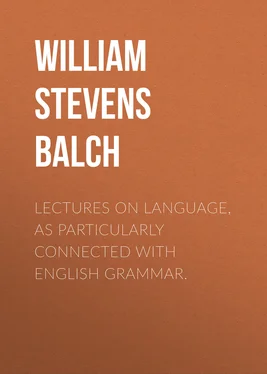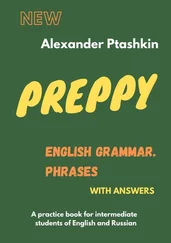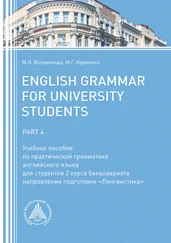William Stevens Balch - Lectures on Language, as Particularly Connected with English Grammar.
Здесь есть возможность читать онлайн «William Stevens Balch - Lectures on Language, as Particularly Connected with English Grammar.» — ознакомительный отрывок электронной книги совершенно бесплатно, а после прочтения отрывка купить полную версию. В некоторых случаях можно слушать аудио, скачать через торрент в формате fb2 и присутствует краткое содержание. Жанр: foreign_edu, foreign_language, на английском языке. Описание произведения, (предисловие) а так же отзывы посетителей доступны на портале библиотеки ЛибКат.
- Название:Lectures on Language, as Particularly Connected with English Grammar.
- Автор:
- Жанр:
- Год:неизвестен
- ISBN:нет данных
- Рейтинг книги:3 / 5. Голосов: 1
-
Избранное:Добавить в избранное
- Отзывы:
-
Ваша оценка:
- 60
- 1
- 2
- 3
- 4
- 5
Lectures on Language, as Particularly Connected with English Grammar.: краткое содержание, описание и аннотация
Предлагаем к чтению аннотацию, описание, краткое содержание или предисловие (зависит от того, что написал сам автор книги «Lectures on Language, as Particularly Connected with English Grammar.»). Если вы не нашли необходимую информацию о книге — напишите в комментариях, мы постараемся отыскать её.
Lectures on Language, as Particularly Connected with English Grammar. — читать онлайн ознакомительный отрывок
Ниже представлен текст книги, разбитый по страницам. Система сохранения места последней прочитанной страницы, позволяет с удобством читать онлайн бесплатно книгу «Lectures on Language, as Particularly Connected with English Grammar.», без необходимости каждый раз заново искать на чём Вы остановились. Поставьте закладку, и сможете в любой момент перейти на страницу, на которой закончили чтение.
Интервал:
Закладка:
One impression would be made on all minds in reference to the single tangible object before them; no matter how learned or ignorant. There stands an animal obvious to all. Let him be removed out of sight, and a very exact picture of him suspended in his place. All again agree. Here then is the proof of our first general principle, viz. all language depends on the fixed and unvarying laws of nature.
Let the picture be removed and a man step forth and pronounce the word, ippos . The Greek starts up and says, "Yes, it is so." The rest do not comprehend him. He then writes out distinctly, ΙΠΠΟΣ. They are in the dark as to the meaning. They know not whether a horse, a man, or a goose is named. All the Greeks, however, understand the meaning the same as when the horse or picture was before them, for they had agreed that ippos should represent the idea of that animal.
Forth steps another, and pronounces the word cheval . Every Frenchman is aroused: Oui, monsieur? Yes, sir. Comprenez vous? Do you understand? he says to the rest. But they are dumb. He then writes C-H-E-V-A-L. All are as ignorant as before, save the Frenchmen who had agreed that cheval should be the name for horse.
Next go yourself, thinking all will understand you, and say, horse ; but, lo! none unacquainted with your language are the wiser for the sound you utter, or the sign you suspended before them; save, perhaps, a little old Saxon, who, at first looks deceived by the similarity of sound, but, seeing the sign, is as demure as ever, for he omits the e , and pronounces it shorter than we do, more like a yorkshire man. But why are you not understood? Because others have not entered into an agreement with you that h-o-r-s-e , spoken or written, shall represent that animal.
Take another example. Place the living animal called man before them. Less trouble will be found in this case than in the former, for there is a nearer agreement than before in regard to the signs which shall be employed to express the idea. This word occurs with very little variation in the modern languages, derived undoubtedly from the Teutonic, with a little change in the spelling, as Saxon mann or mon , Gothic manna , German, Danish, Dutch, Swedish and Icelandic like ours. In the south of Europe, however, this word varies as well as others.
Our language is derived more directly from the old Saxon than from any other, but has a great similarity to the French and Latin, and a kind of cousin-german to all the languages of Europe, ancient and modern. Ours, indeed, is a compound from most other languages, retaining some of their beauties and many of their defects. We can boast little distinctive character of our own. As England was possessed by different nations at different periods, so different dialects were introduced, and we can trace our language to as many sources, German, Danish, Saxon, French, and Roman, which were the different nations amalgamated into the British empire. We retain little of the real old english—few words which may not be traced to a foreign extraction. Different people settling in a country would of course carry their ideas and manner of expressing them; and from the whole compound a general agreement would, in process of time, take place, and a uniform language be established. Such is the origin and condition of our language, as well as every other modern tongue of which we have any knowledge.
There is one practice of which our savans are guilty, at which I do most seriously demur—the extravagant introduction of exotic words into our vocabulary, apparently for no other object than to swell the size of a dictionary, and boast of having found out and defined thousands of words more than any body else. A mania seems to have seized our lexicographers, so that they have forsaken the good old style of "plainness of speech," and are flourishing and brandishing about in a cloud of verbiage as though the whole end of instruction was to teach loquacity. And some of our popular writers and speakers have caught the infection, and flourish in borrowed garments, prizing themselves most highly when they use words and phrases which no body can understand.
I will not contend that in the advancement of the arts and sciences it may not be proper to introduce foreign terms as the mean of conveying a knowledge of those improvements to others. It is better than to coin new words, inasmuch as they are generally adopted by all modern nations. In this way all languages are approximating together; and when the light of truth, science, and religion, has fully shone on all the nations, we may hope one language will be spoken, and the promise be fulfilled, that God has "turned unto the people a pure language, that they may call upon the name of the Lord, to serve him with one consent."
New ideas are formed like new inventions. Established principles are employed in a new combination, so as to produce a new manifestation. Words are chosen as nearly allied to former ideas as possible, to express or represent this new combination. Thus, Fulton applied steam power to navigation. A new idea was produced. A boat was seen passing along the waters without the aid of wind or tide. Instead of coining a new word to express the whole, a word which nobody would understand, two old ones were combined, and " steamboat " became the sign to represent the idea of the thing beheld. So with rail-road, cotton-mill, and gun-powder. In the same way we may account for most words employed in science, although in that case we are more dependant on foreign languages, in as much as a large portion of our knowledge is derived from them. But we may account for them on the same principle as above. Phrenology is a compound of two greek words, and means the science or knowledge of the mind. So of geology, mineralogy, &c. But when improvements are made by those who speak the english, words in our own language are employed and used not only by ourselves, but also by those nations who profit by our investigations.
I trust I have now said enough on the general principles of language as applied to things. In the next lecture I will come down to a sort of bird's eye view of grammar. But my soul abhors arbitrary rules so devoutly, I can make no promises how long I will continue in close communion with set forms of speech. I love to wander too well to remain confined to one spot, narrowed up in the limits fixed by others. Freedom is the empire of the mind; it abjures all fetters, all slavery. It kneels at the altar of virtue and worships at the shrine of truth. No obstacles should be thrown in the way of its progress. No limits should be set to it but those of the Almighty.
LECTURE IV.
ON NOUNS
Nouns defined. – Things. – Qualities of matter. – Mind. – Spiritual beings. – Qualities of mind. – How learned. – Imaginary things. – Negation. – Names of actions. – Proper nouns. – Characteristic names. – Proper nouns may become common.
Your attention is, this evening, invited to the first divisions of words, called Nouns . This is a most important class, and as such deserves our particular notice.
Nouns are the names of things.
The word noun is derived from the Latin nomen , French nom . It means name . Hence the definition above given.
In grammar it is employed to distinguish that class of words which name things, or stand as signs or representatives of things.
We use the word thing in its broadest sense, including every possible entity; every being, or thing, animate or inanimate, material or immaterial, real or imaginary, physical, moral, or intellectual. It is the noun of the Saxon thincan or thingian , to think; and is used to express every conceivable object of thought, in whatever form or manner presented to the human mind.
Читать дальшеИнтервал:
Закладка:
Похожие книги на «Lectures on Language, as Particularly Connected with English Grammar.»
Представляем Вашему вниманию похожие книги на «Lectures on Language, as Particularly Connected with English Grammar.» списком для выбора. Мы отобрали схожую по названию и смыслу литературу в надежде предоставить читателям больше вариантов отыскать новые, интересные, ещё непрочитанные произведения.
Обсуждение, отзывы о книге «Lectures on Language, as Particularly Connected with English Grammar.» и просто собственные мнения читателей. Оставьте ваши комментарии, напишите, что Вы думаете о произведении, его смысле или главных героях. Укажите что конкретно понравилось, а что нет, и почему Вы так считаете.











